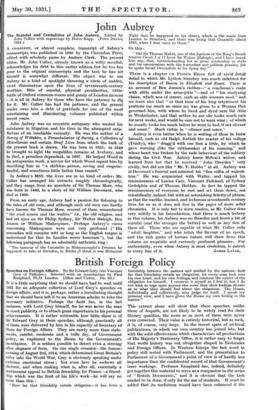John Aubrey
1931.) 1642, when I first came to Oxon."
A COMPLETE, or almost complete, transcript of Aubrey's manuscripts was published in 1898 by the Clarendon Press: edited with scholarly pains by Andrew Clark. The present editor, Mr. John Collier, already known as a witty novelist, acknowledges his debt to this earlier edition, but he too has gone to the original manuscripts' and the task he has set himself is somewhat different. His object was to use Aubrey as a kind of spotlight throwing a circle of sudden, vivid illumination upon the lives of seventeenth-century worthies. Bits of scandal, physical peculiarities, tittle- tattle of Oxford common-rooms and gossip of London taverns —it is all in Aubrey for those who have the patience to dig for it. Mr. Collier has had the patience, and the general reader owes him a debt of gratitude for one of. the most entertaining and illuminating volinnes published within recent years.
John Aubrey was an eccentric antiquary who wasted his substance in litigation and his time in the attempted satis- faction of an insatiable curiosity. He was the author of a Survey of Wiltshire, a Perambulation of Surrey, a Collection of Miscellanies and certain Brief Lives from which the bulk of the present book is drawn. He was born in 1625; in 1649 he brought to light the megalithic .remains at Avebury, and he died, a penniless dependent, in 1697. He helped Wood in his antiquarian work, a service for which Wood repaid him by describing him as " a shiftless person, roving and magotie- headed, and sometimes little better than erased."
In Aubrey's MSS. the lives are in no kind of order; Mr. Collier has arranged his extracts roughly chronologically, and they range from an anecdote of Sir Thomas More, who was born in 1480, to a story of Sir William Davenant, who died in 1668.
From an early age, Aubrey had a passion for listening to the tales of old men, and although such old- men can hardly have known Sir Thomas More, several of them remembered " the rood screen and the wafers," ix., the old religion, and had set eyes on Sir Philip Sydney, Sir 'Walter Raleigh, Ben Jonson or William Shakespeare. Perhaps Aubrey's views concerning Shakespeare were not very profound (" His comoedies will remain witt as long as the English tongue is understood for that he handles mores hominum"), but the following paragraph has an admirably authentic ring :
"The humour of the Constable in Midsomernight's Dreame, he happened to take at Grendon, in Bucks .(I _think it was Midsomer
Or this :
" Old Sir Thomas Malett, one of the Justices of the King's Bench tempoie Caroli I et 11 knew Sir Walter (Raleigh), and I have heard him say, that, notwithstanding his so great mastership in style and his conversation with the learneclest and politest persona, yet he spake broad Devonshire to his dying day."
There is a chapter cn Francis Bacon full of vivid detail detail to which Mr. Lytton Strachey was much indebted for his description of Bacon in Elizabeth and Esser. There is an account of Ben Jonson's clothes—" a coachman's coate with slitts under the arme-pitts "—and of " his studyeing cbaire, which was of strawe, such as olde woemen used," and we learn also that " at that time of his hang retyrement his pentions (so much as came in) was given to a Woman that governed him, with whom he lived and dyed nere the Abie in Westminster, and that nether he nor she tooke much care for next weeke, and would be sure not to want wine ; of which he usually tooke too much before he went to bed, if not oftener and soner." Much virtue in " oftener and soner."
Aubrey is even better when he is writing of those he knew himself, such as old Ralph Kettell the master of his college (Trinity), who " dragg'd with one foot a little, by which he gave warning (like the rattlesnake) of his comeing," and whose heart was broken by the rude behaviour of the soldiery during the Civil War. Aubrey knew Milton's widow, and learned from her that he received " John Dreyden " very civilly, but did not like " Mr. T. Hobbs " at all. Aubrey was atDavenant's funeral and admired his "fine coffin of walnut- tree." He was acquainted with Waller, and tapped his reminiscences of Lucius Cary, Viscount Falkland, of Sydney Godolphin and of Thomas Hobbes. In fact he tapped the reminiscences of everyone he met and set them down, not scientifically, indeed, but with an astonishing felicity of phrase, so that the warlike, learned, and lecherous seventeenth century lives for us as it does not live in the pages of more sober chronicles. It is only fair to warn readers, as Mr. Collier does very wittily in his Introduction, that there is much lechery in this volume, for Aubrey was no Bowdler and loved a bit of scandal (and the stronger the better) as well as any don of them all. Those who are capable of what Mr. Collier calls " adult laughter," and who relish the flavour of an epoch, and the rich gusto of human nature will draw from this volume an exquisite and curiously profound pleasure. For authenticity, even when Aubrey is most credulous, is patent






































 Previous page
Previous page